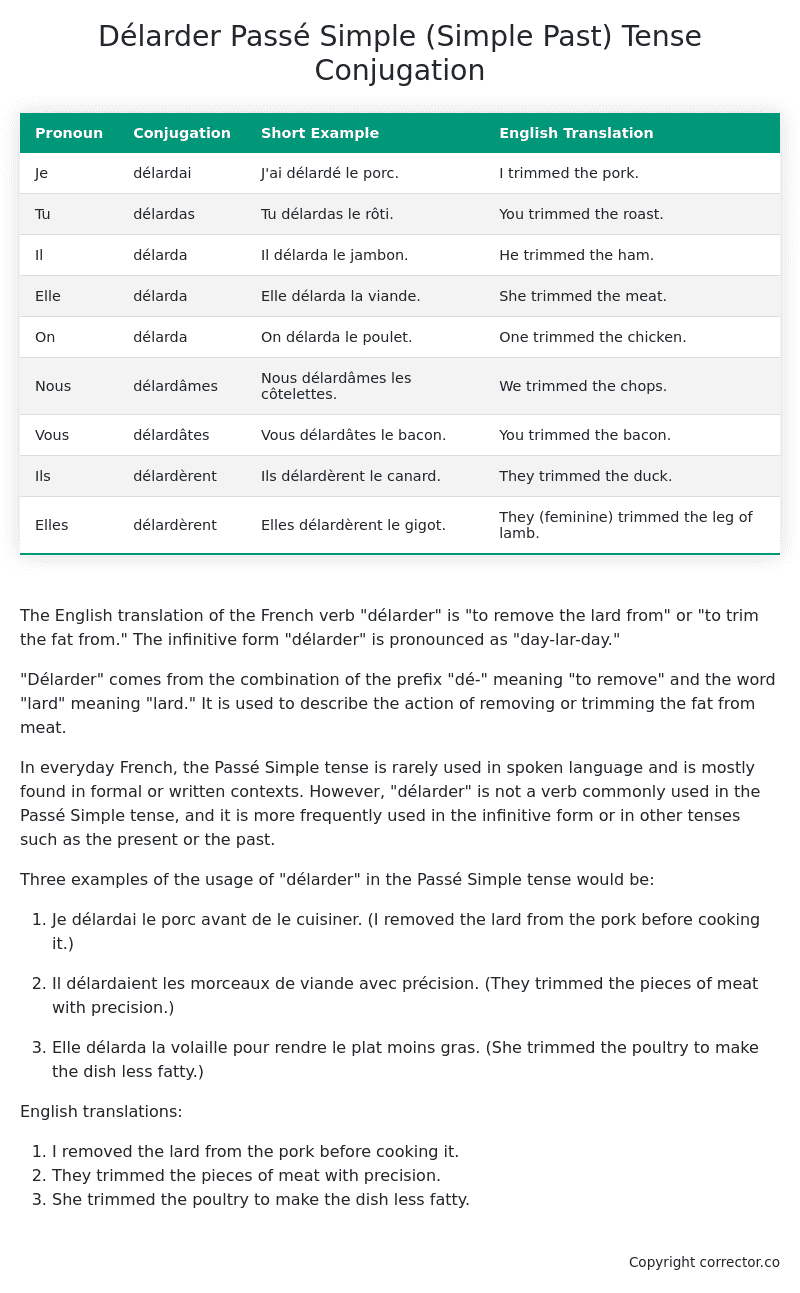Passé Simple (Simple Past) Tense Conjugation of the French Verb délarder
Introduction to the verb délarder
The English translation of the French verb “délarder” is “to remove the lard from” or “to trim the fat from.” The infinitive form “délarder” is pronounced as “day-lar-day.”
“Délarder” comes from the combination of the prefix “dé-” meaning “to remove” and the word “lard” meaning “lard.” It is used to describe the action of removing or trimming the fat from meat.
In everyday French, the Passé Simple tense is rarely used in spoken language and is mostly found in formal or written contexts. However, “délarder” is not a verb commonly used in the Passé Simple tense, and it is more frequently used in the infinitive form or in other tenses such as the present or the past.
Three examples of the usage of “délarder” in the Passé Simple tense would be:
-
Je délardai le porc avant de le cuisiner.
(I removed the lard from the pork before cooking it.) -
Il délardaient les morceaux de viande avec précision.
(They trimmed the pieces of meat with precision.) -
Elle délarda la volaille pour rendre le plat moins gras.
(She trimmed the poultry to make the dish less fatty.)
English translations:
- I removed the lard from the pork before cooking it.
- They trimmed the pieces of meat with precision.
- She trimmed the poultry to make the dish less fatty.
Table of the Passé Simple (Simple Past) Tense Conjugation of délarder
| Pronoun | Conjugation | Short Example | English Translation |
|---|---|---|---|
| Je | délardai | J’ai délardé le porc. | I trimmed the pork. |
| Tu | délardas | Tu délardas le rôti. | You trimmed the roast. |
| Il | délarda | Il délarda le jambon. | He trimmed the ham. |
| Elle | délarda | Elle délarda la viande. | She trimmed the meat. |
| On | délarda | On délarda le poulet. | One trimmed the chicken. |
| Nous | délardâmes | Nous délardâmes les côtelettes. | We trimmed the chops. |
| Vous | délardâtes | Vous délardâtes le bacon. | You trimmed the bacon. |
| Ils | délardèrent | Ils délardèrent le canard. | They trimmed the duck. |
| Elles | délardèrent | Elles délardèrent le gigot. | They (feminine) trimmed the leg of lamb. |
Other Conjugations for Délarder.
Le Present (Present Tense) Conjugation of the French Verb délarder
Imparfait (Imperfect) Tense Conjugation of the French Verb délarder
Passé Simple (Simple Past) Tense Conjugation of the French Verb délarder (You’re reading it right now!)
Passé Composé (Present Perfect) Tense Conjugation of the French Verb délarder
Futur Simple (Simple Future) Tense Conjugation of the French Verb délarder
Futur Proche (Near Future) Tense Conjugation of the French Verb délarder
Plus-que-parfait (Pluperfect) Tense Conjugation of the French Verb délarder
Passé Antérieur (Past Anterior) Tense Conjugation of the French Verb délarder
Futur Antérieur (Future Anterior) Tense Conjugation of the French Verb délarder
Subjonctif Présent (Subjunctive Present) Tense Conjugation of the French Verb délarder
Subjonctif Passé (Subjunctive Past) Tense Conjugation of the French Verb délarder
Subjonctif Imparfait (Subjunctive Imperfect) Tense Conjugation of the French Verb délarder
Subjonctif Plus-que-parfait (Subjunctive Pluperfect) Tense Conjugation of the French Verb délarder
Conditionnel Présent (Conditional Present) Tense Conjugation of the French Verb délarder
Conditionnel Passé (Conditional Past) Tense Conjugation of the French Verb délarder
Conditionnel Passé II (Conditional Past II) Tense Conjugation of the French Verb délarder
L’impératif Présent (Imperative Present) Tense Conjugation of the French Verb délarder
L’impératif Passé (Imperative Past) Tense Conjugation of the French Verb délarder
L’infinitif Présent (Infinitive Present) Tense Conjugation of the French Verb délarder
L’infinitif Passé (Infinitive Past) Tense Conjugation of the French Verb délarder
Le Participe Présent (Present Participle) Tense Conjugation of the French Verb délarder
Le Participe Passé (Past Participle) Tense Conjugation of the French Verb délarder
Struggling with French verbs or the language in general? Why not use our free French Grammar Checker – no registration required!
Get a FREE Download Study Sheet of this Conjugation 🔥
Simply right click the image below, click “save image” and get your free reference for the délarder Passé Simple tense conjugation!

Délarder – About the French Passé Simple (Simple Past) Tense
Formation
Usage
Narration
Historical Context
Interactions with other tenses
Passé Composé
Imparfait
Conditional and Subjunctive
Summary
I hope you enjoyed this article on the verb délarder. Still in a learning mood? Check out another TOTALLY random French verb conjugation!


